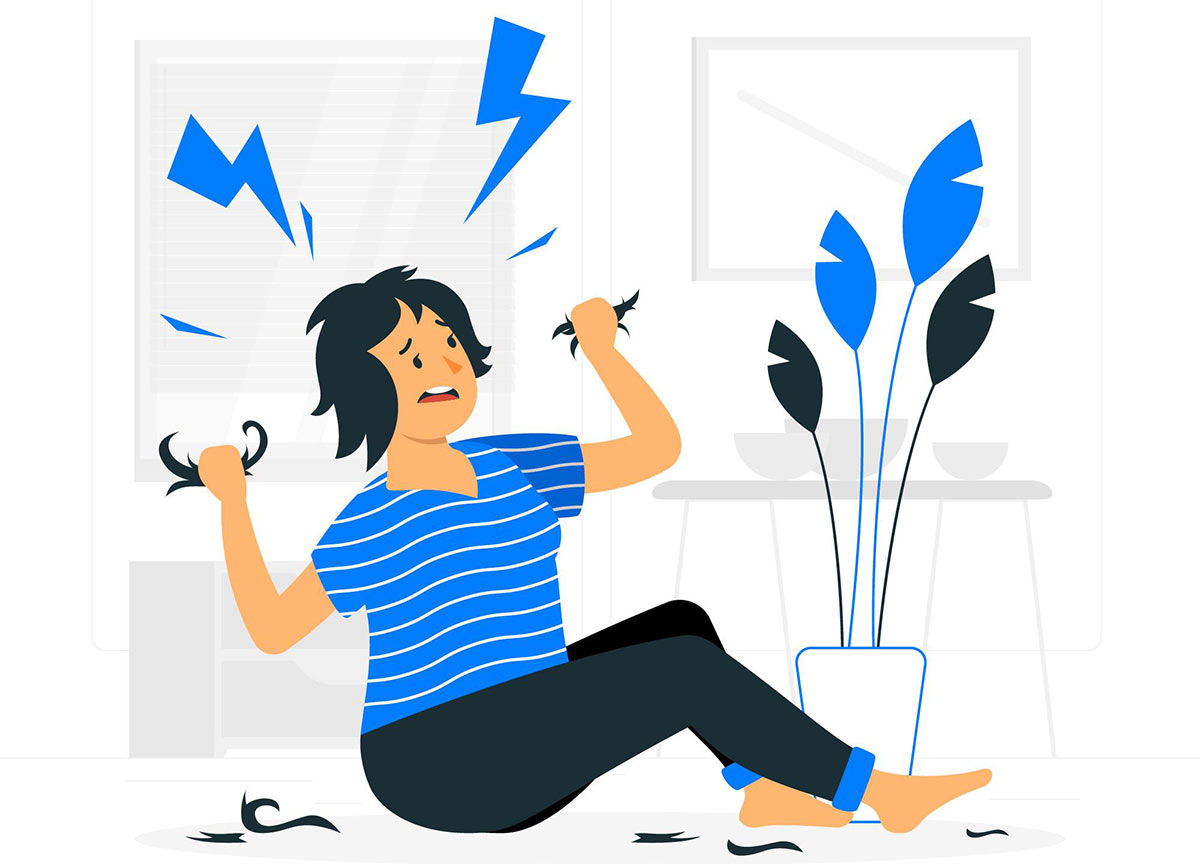
Phobias are intense fear responses we experience when faced with certain stimuli or situations. Among them, impulsive phobias are characterized by an irrational fear of losing control and engaging in impulsive and dangerous actions, such as harming oneself or others.
What are impulsive phobias?
Impulsive phobias are classified within the broader spectrum of anxiety disorders. Unlike specific phobias, they are not linked to external objects or situations but rather to internal thoughts. These phobias manifest as a persistent and irrational fear of losing control over one’s impulses, which is believed could lead to committing unwanted or dangerous acts.
For example, a person with an impulsive phobia might fear stabbing someone with a knife, jumping in front of a moving vehicle, or having sexual thoughts about minors. Often, these fears are not based on a genuine desire to perform these actions, but rather on the distress caused by the possibility of losing control and doing them involuntarily.
These thoughts are typically ego-dystonic, meaning they are contrary to the person’s values and desires. The distress arises from the possibility of these thoughts becoming reality, even though the individual does not want that to happen.
They are characterized by:
- Intrusive Thoughts: They emerge suddenly and are perceived as uncontrollable and distressing.
- Fear of Losing Control: The person fears they could give in to these impulsive thoughts at any moment and carry out the dreaded action, even though they have no intention of doing so.
- Avoidance Behaviors: To manage anxiety, the individual may avoid situations considered high-risk, such as being near an open window or using sharp objects.
Are they dangerous?
Despite the fear they generate, it is important to note that people who suffer from these phobias rarely act on these thoughts, as they cause great discomfort and contradict their values. These thoughts do not represent a genuine desire to carry out the feared actions; on the contrary, they are usually against the person’s will.
People who experience them are not dangerous to others. The real danger lies in the psychological impact these thoughts have on those affected. The fear of losing control can lead to elevated levels of anxiety, depression, and avoidance behaviors.
Relationship with Obsessive-Compulsive Disorder (OCD)
Impulsive phobias are closely related to Obsessive-Compulsive Disorder (OCD). In fact, in many cases, impulsive phobias are considered a specific manifestation of OCD, particularly within the subtype known as “Pure O” or “Purely Obsessional OCD.”
In Pure OCD, the main symptoms are obsessions (intrusive and distressing thoughts) and mental compulsions, rather than obvious behavioral compulsions.
Although impulsive phobias and OCD share many characteristics, there are some key differences. In OCD, the person often performs mental rituals or repetitive behaviors (compulsions) to reduce the anxiety associated with the obsessions. In contrast, in impulsive phobias, anxiety is often managed through avoiding situations considered dangerous.
For example, someone with OCD might repeatedly check whether they’ve locked the door to prevent an intrusion. On the other hand, a person with an impulsive phobia might avoid being near a high window for fear of suddenly jumping out.
Both disorders share a cognitive mechanism known as “thought-action fusion,” in which individuals believe that having a thought about an act is morally equivalent or increases the likelihood of it happening in reality. However, this is not the case.
Causes and Risk Factors
Impulsive phobias, like other anxiety disorders, have multifactorial causes. While there is no single cause, various factors contribute to their development. Psychologically, people who tend to be perfectionists or have a high level of self-demand may be more vulnerable to impulsive phobias. Experiencing trauma or significant stress can also predispose individuals to these phobias.
Impact on Daily Life
The impact of impulsive phobias can be profound and debilitating. The constant fear of losing control can lead a person to avoid a wide range of situations, from social activities to everyday tasks. This avoidance reinforces the phobia, feeding the cycle of anxiety and restriction.
Additionally, the ongoing distress can affect interpersonal relationships. The person may become more dependent on others to feel safe, which can create tension and misunderstandings. The phobia can also affect performance at work or school, as concentration and decision-making abilities can be compromised by constant worry.
The ongoing struggle with these intrusive thoughts can lead to depression, low self-esteem, and feelings of guilt or shame for having such thoughts, even if they never act on them.
Furthermore, they often have a high degree of intolerance to uncertainty. This means they experience great distress at the possibility that their worst fears might come true, even if the likelihood is extremely low.
If you think you or someone you know may have an impulsive phobia:
- Recognize the problem: The first step is understanding that the intrusive thoughts you are experiencing do not reflect your true desires or intentions. Impulsive phobias generate fear of losing control, but these thoughts are irrational and do not mean you will actually act on them.
Note: Having intrusive thoughts about losing control is something many people may experience occasionally. Having these thoughts once in a while, if they are not recurrent and do not interfere with your daily life, should not be a cause for alarm and does NOT mean you have any kind of disorder. If this happens to you occasionally, don’t give it much importance. We all have intrusive thoughts at some point.
- Avoid self-criticism: It is common to feel shame or guilt for having these thoughts, but remember you are not alone. Many people experience impulsive phobias, and these thoughts do not define you. Avoid judging yourself for having them.
- Seek professional support: Talking to a psychologist or psychiatrist is a crucial step. Cognitive-Behavioral Therapy (CBT) is particularly effective in treating this type of disorder.
- Learn anxiety management techniques: Practice relaxation or mindfulness techniques, such as deep breathing, meditation, or mindfulness. These tools can help you reduce anxiety when intrusive thoughts arise.
- Avoid avoidance: Although avoidance may seem like a short-term solution, it actually tends to strengthen the phobia. Facing your fears with proper support is key to overcoming them.
- Inform your close circle: If you feel comfortable, sharing your experiences with trusted friends or family can ease the emotional burden. Sometimes, talking about what you are going through can reduce isolation and help you gain support.
Overcoming an impulsive phobia takes time, and it’s normal to have ups and downs along the way. The important thing is to stay committed to treatment and trust that improvement is possible.
Júlia Tarancón Estades
Psychologist Col. No B-3232








